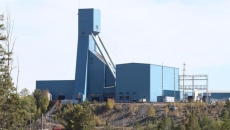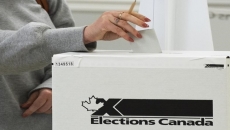OTTAWA - Consumers appears to have helped the Canadian economy through a July stumble, as Statistics Canada reported Friday that real gross domestic product dropped 0.1 per cent in the month before rebounding in August.
The July figure was better than the agency's initial estimate of a contraction of 0.4 per cent, as warmer weather, easing of public health restrictions and lower COVID-19 case counts packed patios and saw Canadians travelling.
The accommodation and food services sector, which has felt the brunt of public health measures restricting in-person services and travel, rose by 12.5 per cent in July, marking the second straight month of double-digit growth.
Air transportation rose 67.7 per cent in the July travel season after fully vaccinated visitors were no longer required to quarantine as of July 5.
The boost in service-sector spending appears to have carried over to August as well into September based on some early indicators for the just-completed month, TD senior economist Sri Thanabalasingam said.
Still, each sector is still well below where it was just before the pandemic struck. The accommodations and food services sector in July was 21.3 per cent below February 2020 levels, while air transportation was nearly 83 per cent below pre-pandemic levels.
"As it starts to close off on its pre-pandemic level, that's when we can start to see growth slow," Thanabalasingam said in an interview. "And then moving into the fall and winter, we're probably going to see some some risks, especially in the form of the the fourth wave and cooler weather, impacting spending in those areas."
Statistics Canada said total economic activity in July was about two per cent below pre-pandemic levels recorded in February 2020, a gap that closed to one per cent in August when factoring in the agency's initial estimate of an increase of 0.7 per cent in GDP for the month. The August GDP figure will be finalized at the end of October.
RBC economist Claire Fan wrote that further increases in GDP are going to be harder to come by, particularly into next year as inflation concerns replace worries about growth and central banks, like the Bank of Canada, consider raising their rock-bottom interest rates.
In Canada, the decision would come against the backdrop of promised new federal spending that the Trudeau Liberals pledged on the campaign trail.
A post-election analysis by Rebekah Young, Scotiabank's director of fiscal and provincial economics, estimated that the $13 billion the Liberals promised in new spending this fiscal year and next could add around two-tenths of a percentage point to output, but may also force the central bank to raise rates sooner than planned.
She wrote that a half-a-percentage-point increase in the target overnight rate would temporarily dampen economic activity by about 0.2 percentage points of GDP, effectively offsetting the fiscal boost.
The central bank has a scheduled rate announcement later this month. BMO chief economist Douglas Porter said the economic indicators released Friday help reinforce the view that the Bank of Canada will further roll back its bond-buying program that is designed to encourage interest rates on mortgages and business loans to go, and stay, low.
While the majority of sectors Statistics Canada tracks grew in July, declines in sectors such as agriculture, utilities and manufacturing more than offset any gains.
Heat and drought in the West cut crop production, except cannabis, to its lowest level since November 2007, while cooler weather in central Canada helped drive down utilities spending by 4.9 per cent. Meanwhile, ongoing supply-chain constraints drove down manufacturing by 1.1 per cent in July.
The construction sector fell by 0.9 per cent, which Statistics Canada said was driven by a third straight month of declines in residential building activity after reaching a record high in April.
"That said, housing markets appear to be perking up again, and these sectors could reaccelerate, particularly if consumers end up spending more time at home again this winter," said CIBC senior economist Royce Mendes.






